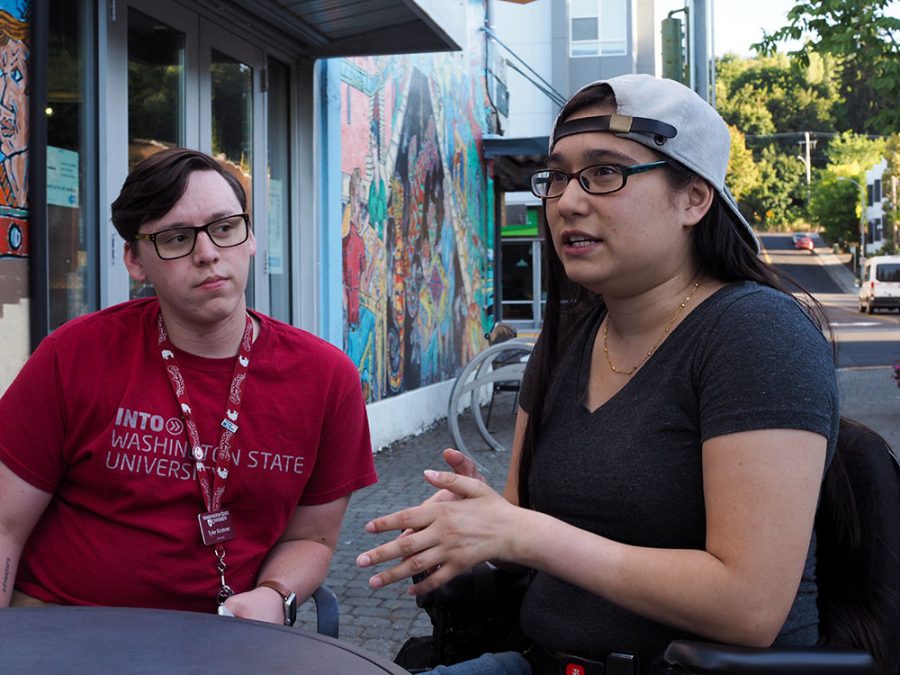Alliance group for faculty and staff with disabilities hope to expand resources
Social for fall semester to be held at 4 p.m., Sept. 5 in the Student Recreation Center
GRACE JOO | THE DAILY EVERGREEN
Student services coordinator Tyler Kirshner, left, listens as Acacia Kapusta, former outreach and education coordinator for the Office of Outreach and Education, discusses the Disabled Staff and Faculty + Allies Affinity Group on Monday at Thomas Hammer Coffee Roasters.
August 21, 2019
A WSU affinity group formed in January to provide resources for faculty and staff with disabilities to receive accommodations during work.
The upcoming social meeting for the fall semester will be at 4 p.m. on Sept. 5 in the Student Recreation Center, Room 144.
Acacia Kapusta, former outreach and education coordinator for Gender Identity/Expression and Sexual Orientation Resource Center (GIESORC), said there was not a group or community that represented staff and faculty with disabilities.
She said she had support from GIESORC Director Matthew Jefferies to start the affinity group, which had its first meeting for the Disabled Staff and Faculty + Allies affinity group in February.
Tyler Kirshner, vice chair of the affinity group, said they were fortunate enough to attend the Disability Awareness Symposium, which focuses on and celebrates diversity.
But the symposium had an event that omitted the term “disability” in their explanation od diversity during the panel discussion titled Diversity: Do We Really Need It In Washington’s Higher Education Institutions, he said.
Kirshner said the situation motivated them to bring awareness about disability to WSU.
Kapusta said more people have communicated about not being able-bodied and asking for personal advice.
The resources the group is seeking from the university is accessibility accommodations for staff, faculty and students, Kirshner said.
Students have the WSU Access Center, but faculty and staff go through a difficult process to receive special accommodations that help them perform their jobs properly, he said.
“They have to get documentation from doctors, and renew it every year,” Kirshner said.
He said they are focused on growing faculty and staff membership and having a bigger effect through storytelling and training. He hopes to eventually work with student groups to provide them with resources as well.
Kapusta said the main goal of the affinity group is the recruitment and retention of faculty and staff.
“It is a very unique experience to be disabled as a faculty or staff member,” she said.
She said the biggest aspect of retaining staff is having a space for them to find a community that has similar experiences.
“We will be participating in a summit to show the university what we do, and the effects it has on the community,” Kirshner said.
The summit invites about 30 organizations that focus on diversity, equity and inclusion, Kapusta said.
Kirshner said they are working with other affinity groups to have the university recognize them and have more resources available to the group.
Some staff and faculty may not share their personal issues with their supervisors, human resources or ask for help, Kapusta said.
Kirshner said he was not able to talk about his disability until forming the affinity group.
“It is something you think is minor, but in people’s everyday life it truly ranges,” he said.
*This article was updated to clarify that an event titled Diversity: Do We Really Need It In Washington’s Higher Education Institutions omitted the term “disability.”










